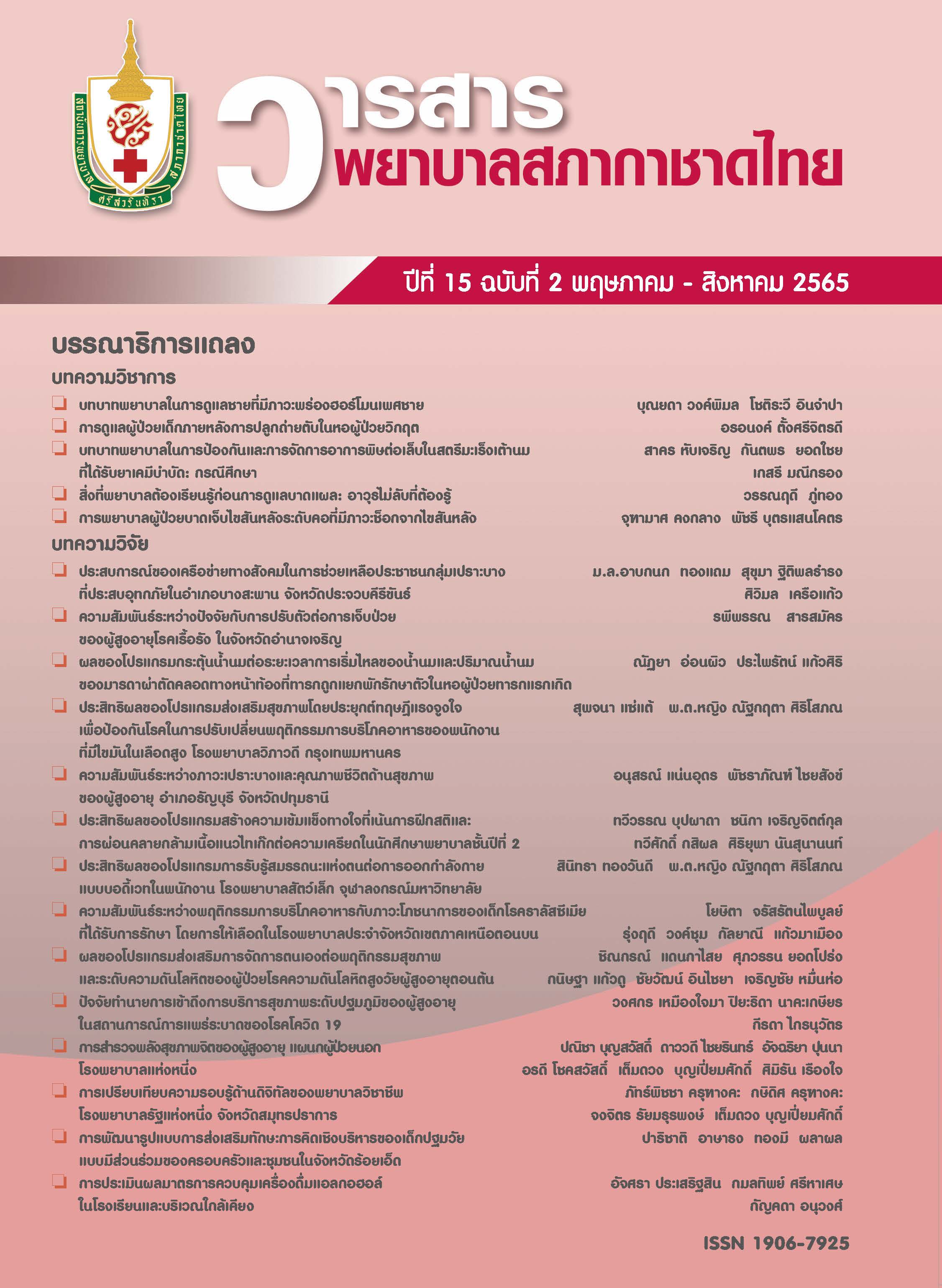The Effectiveness of a Self-efficacy Program on Body-weight Exercise of Staff in the Small Animal Hospital,Chulalongkorn University.
Keywords:
Self-efficacy, outcome expectancies, body-weight exerciseAbstract
The objective of this quasi-experimental research was to examine the effectiveness of a self-efficacy program promoting body-weight exercises for personnel in a small animal hospital at Chulalongkorn University by applying self-efficacy theory. The participants were personnel aged between 22-60 years old and working in the field of animal treatment. A sample of 50 staff was randomly assigned to either a treatment group (n = 25) or a control group (n = 25). The intervention group received the self-efficacy program designed to promote self-efficacy in performing body-weight exercises and the outcome expectation of exercise performance. Meanwhile, the control group received a weight-based exercise poster. Data were collected by self-administered questionnaires and analyzed using descriptive statistics, paired t-test, and independent t-test.
The findings indicated that the average score on body-weight exercise of the Chulalongkorn University Small Animal Hospital personnel after participating in the self-efficacy program was statistically significantly higher than before participating in the program and was statistically significantly higher than the control group (p < .05).
The self-efficacy program to promote body-weight exercise effectively encouraged the personnel in a small animal hospital at Chulalongkorn University to perform body-weight exercises that further enhanced work efficiency. This can be used as a guideline for promoting exercise among employees working in other animal hospitals.
References
National Statistical Office. Working conditions of the population of December 2019 [Internet]. 2019 [cited 2020 Feb 1]. Available from: https://cutt.ly/gbI7hTI (in Thai)
Department of Physical Education Ministry of Tourism and Sport. Annual report 2019 [Internet]. 2019 [cited 2020 Dec 2]. Available from: https://cutt.ly/ZbI4KSA (in Thai)
Suponta A. Check the rating of Thai. How fit life is [Internet]. 2014 [cited 2020 May 5]. Available from: https://cutt.ly/EbI4cmd (in Thai)
Sirakan. Resistance exercise reduce osteoporosis [Internet]. 2019 [cited 2020 Jun 10]. Available from: https://goodlifeupdate.com/healthy-body/107933.html (in Thai)
Department of Disease Control. Health behavior modi fication course for the nurse case manager, chronic disease. Bangkok: Printing Business Office War Veterans Organization of Thailand; 2016. p. 61-9. (In Thai)
Suksom D. Exercise for health. Bangkok: Chulalongkorn University Printing House; 2018. (in Thai)
Bandura A. Self-efficacy: the exercise of control. New York: W. H. Freeman; 1997.
Rukhatiwong P, Jitramontree N, Wirojratana V. The effect of self-efficacy enhancement program on exercise behavior in older adults with subdural hematoma. Vajira Nursing Journal 2020;22(1):33-44. (in Thai)
Sirisopon N, Phungdee T. Development of self-efficacy to diet and exercise behaviors intention of type 2 diabetes mellitus patients. J Royal Thai Army Nurses 2020;21(1): 167-75. (in Thai)
Boonngam L, Toonsiri C, Junprasert S. Effects of the qigong exercise program on blood pressure levels among prehypertensive women in meuang district, Sing Buri Province. The Journal of Faculty of Nursing Burapha University 2017;25(1):82-94. (in Thai)
Khamsom S, Terathongkum S, Kittipimpanon K. Effects of arm swing exercise program on HbA1C and nutritional status in community dwelling older adults with type 2 diabetes. Thai Journal of Nursing and Midwifery Practice 2017;4(2):46-60. (in Thai)
Udomphittayarat K, Health education program applying self-efficacy theory to promote exercise behavior in essential hypertensive patients. Veridian E-Journal 2014;7(1): 62-72. (in Thai)
Thanaphonganan N, Khumhong P, Waengnork W. The effectiveness of applying self-efficacy theory on promoting exercise behaviors of the elderly in Borabue District, Mahasarakham Province. The Public Health Journal of Burapha University 2019;14(1): 106-18. (in Thai)
Nochit W, Tangwongkit T, Jadpum J, Deeprasit M. The effect of stabilization back exercise promotion program on exercise behavior and back muscle endurance among farmers, Journal of Nursing and Education 2017;10(4):48-62. (in Thai)
Boonsawad P, Pumduang A, Auswapinyokit N, Tongboonchoo C. The effect of complementary and integrative therapy on pain and pain distress in patients with cancer. Thai Red Cross Nursing Journal 2020;13(2):257-70. (in Thai)
Sukwiboon T. Criteria for the most suitable interpretation of rating scale [Internet]. 2009 [cited 2021 Jan 23]. Available from: https://ms.src.ku.ac.th/schedule/files/2553/ Oct/1217086.doc (in Thai)
Phungdee T. The effectiveness of exercise behaviors promotion program of diabetes mellitus type 2 patients [Thesis]. Bangkok: Kasetsart University; 2016. (in Thai)
Farelly FJ, Quester PG. Examining important relationships quality constructs of the focal sponsorship exchange. Ind Market Manag; 2005;34(3):211-9.
Klayprom P, Tingsabhat S. Effect of health program coupled bodyweight program of lower Secondary school underweight students. OJED 2018;13(4):316-23. (in Thai)
Liu Y, Liu Sx, Cai Y, Xie KL, Zhang WL, Zheng F. Effects of combined aerobic and resistance training on the glycolipid metabolism and inflammation levels in type 2 diabetes mellitus. J Phys Ther Sci 2015;27(7):2365-71. doi: 10.1589/jpts.27.2365.
Downloads
Published
Issue
Section
License
Copyright (c) 2022 Srisavarindhira Thai Red Cross Institute of Nursing

This work is licensed under a Creative Commons Attribution-NonCommercial-NoDerivatives 4.0 International License.
เนื้อหาบทความหรือข้อคิดเห็นต่างๆ ในวารสารพยาบาลสภากาชาดไทยนี้ เป็นความคิดเห็นของผู้เขียนบทความ ไม่ใช่ความเห็นของกองบรรณาธิการ หรือสถาบันการพยาบาลศรีสวรินทิรา สภากาชาดไทย






